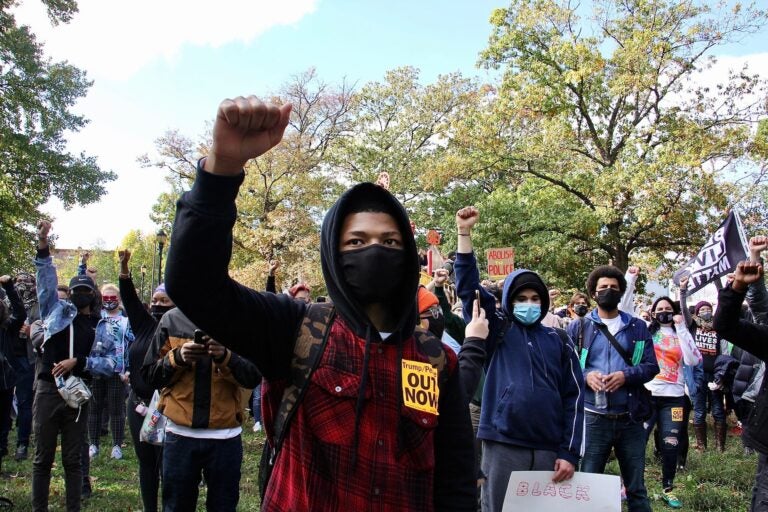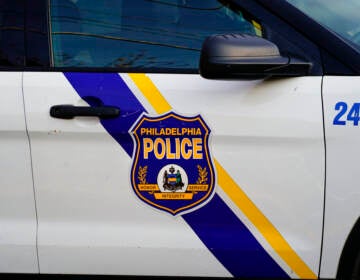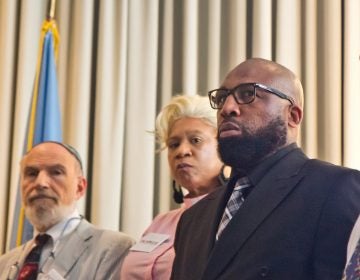What should Philly expect after the city releases the Walter Wallace Jr. bodycam footage?
Morning Edition host Jennifer Lynn speaks with WHYY’s community contributors and engagement editor Chris Norris about the Walter Wallace Jr. footage.
Listen 5:58
Protesters gather at Malcolm X Park responding to the police shooting of Walter Wallace Jr. (Emma Lee/WHYY)
This Wednesday, the public will have access to the bodycam video of police shooting Walter Wallace, Jr. — which happened one week ago.
Wallace was killed outside his family’s home in the Cobbs Creek neighborhood of West Philadelphia. His mother said she called 911 asking for an ambulance to help him because he was having a mental health crisis. Two officers who responded to the scene each fired multiple rounds at Wallace, who was holding a knife.
What followed were protests, marches, and in some areas, looting. Then came curfews to quell unrest.
WHYY’s community contributors and engagement editor Chris Norris has been following this case closely. He’s the host of WHYY-TV series “Police Reimagined” — panel discussions about the future of public safety.
I asked him to talk about the body camera footage which has been viewed by city officials, the Wallace family, and their defense attorneys, Kevin O’Brien and Shaka Johnson.
–
According to the attorney, Shaka Johnson, he made this clear [that] you don’t see Walter Wallace lunging at the officers — which was what was previously reported — which is the justification the officers had for shooting Mr. Wallace. The lawyer says you don’t see that. He also says in the video you hear the officer who was intending to kill. He says, “Shoot him,” and then he shot him. And that’s what we know so far.
And the family, what is the lawyer saying about what the family wants at this tender time?
The family doesn’t want the officers charged with murder, which is rather surprising for me. But the justification is because in some ways, the officers were also the victims of bad training and not having proper resources, that they were sent out in the field without the equipment that they needed to properly de-escalate, and that the fault really lies at the feet of the mayor and the police commissioner.
And when we talk about the equipment that they did not have, these two officers were not equipped with tasers.
That’s correct. In fact, what I believe to be two-thirds to one-half of the department does not have tasers. And that’s become one of the prevailing narratives of this whole story, is that the police have spent $61 million in overtime in 2019 and $18 million in overtime during the summer of the uprising and yet still have no money for tasers. Emerging from this conversation of criminal justice is one about fiscal responsibility.
When the footage is released to the public, which is said to be later this week, what should the city be prepared for?
That’s a really, really hard question to answer, because I don’t think you could prepare for anything anymore. We are living in unprecedented times. I’ve been covering these types of issues since 2012. I’ve never seen the level of uprising we’re seeing now, the level of fearlessness in some young folks to confront the police. The cell phone footage that’s already been released is a clear enough angle to be outraged. I think, though, if the lawyer is correct and you do not see Walter Wallace lunge at the officers, I anticipate much more outrage, much more protesting and potentially much more looting.
Chris, you went to the West Philadelphia neighborhood, the Cobbs Creek neighborhood, after Walter Wallace Jr. was gunned down by police. You spoke with Tommy Blackwell, who is an activist and grandson of Lucien and Jannie Blackwell, who were Philadelphia City Councilmembers. And what did he tell you about the ripple effect in that neighborhood after the death of Walter Wallace Jr.?
The conversation with Tommy and with others, they kept using the word ‘warzone’ and ‘war.’ Tommy’s wife Saj said, you know, “They brought the war to our door.” And as I’m talking to Tommy and others, you can hear the helicopters above their home. And I just kept thinking what it must be like to live, to sleep, to care for your children where the police are at war with the public and the public is at war with the police. The police commissioner can say that the officers are not at war, but the scenes we have seen, they’re at war and people are scared; people are traumatized. And there’s also a conversation to be had about logic. People are responding to police violence, so I don’t know how logical it is to put back into the neighborhood what is the catalyst for the uprising in the first place.
This is a story about a lot of different things, right?
So we at WHYY are going to continue reporting this story and looking at it in the context of an institutional failure of the city of Philadelphia to properly train and equip these officers to properly de-escalate situations. It’s an institutional failure by the police department and the city to not have had staffed, in that precinct, a behavioral health specialist who could respond to this call. It’s an institutional failure on behalf of the police department to not have, as has been reported, partnered formally with the Mental Health Consortium in that neighborhood that had been offering its services and that was familiar with the Wallace family. It’s also a story about occupation, and how people are occupied in their neighborhoods by police, and reoccupied when police do bad. It’s also, of course, a story about race and class. These incidents don’t happen in Rittenhouse Square. These incidents don’t happen in Manayunk. And the reason they don’t happen is because the value of life, it’s perceived differently by the officers who patrol in these neighborhoods. [They] are resourced differently and they’re policed differently.
And it’s a story of a family that is now having to cope with a punctuation point in their lives going forward with the loss of their loved one. Chris Norris, thank you so much.
Thank you.
Chris Norris is WHYY’s community contributors and engagement editor.

Get daily updates from WHYY News!
WHYY is your source for fact-based, in-depth journalism and information. As a nonprofit organization, we rely on financial support from readers like you. Please give today.





